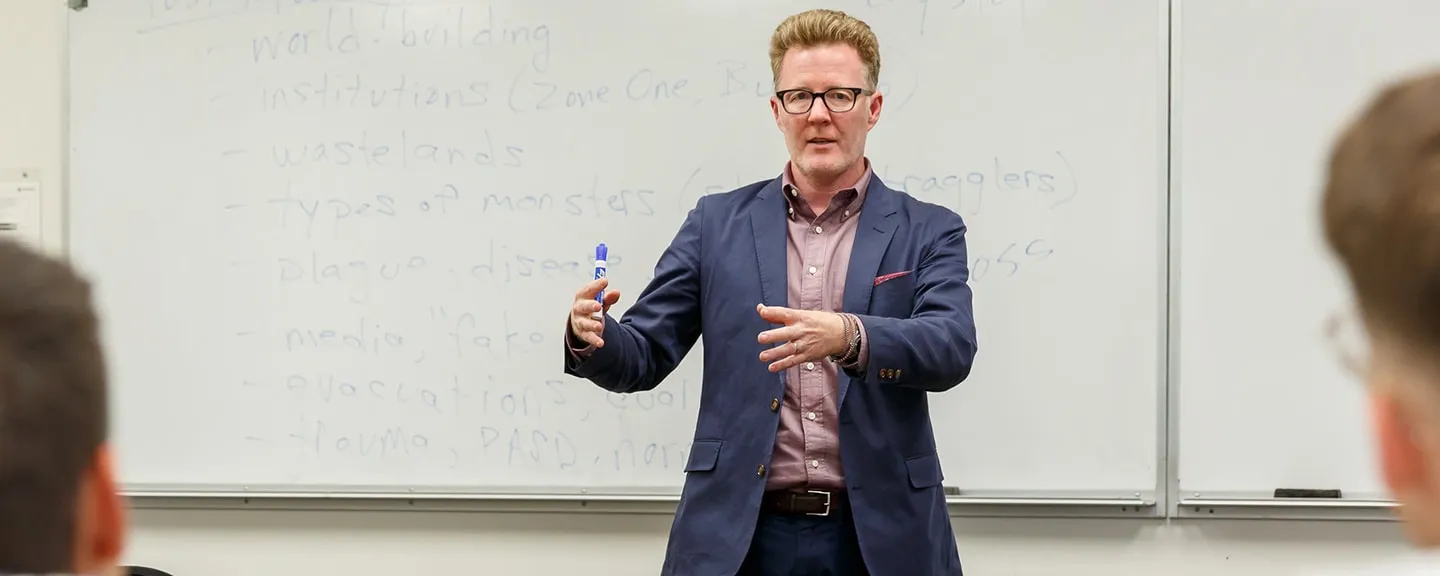- Home
- >
- APU Articles
- >
- News Article
What Is a Liberal Arts Education?
November 01, 2018 | Written By John Montesi

The idea behind a liberal arts education is that rather than focusing strictly on a stated degree or career outcome, a student pursuing a liberal arts degree—or a degree from a liberal arts college—will broaden his or her intellectual horizons while also learning practical skills in business, science, and languages.
So, What Is a Liberal Arts Education?
The history of liberal arts dates back to many of the famous Greek and Roman philosopher-educators who we still study today. From classroom discussions based on Socrates’ method to reading Plato, Homer, and Cicero, the roots of a liberal arts education are directly visible in today’s classrooms.
Over the years, a number of disciplines have gathered under the liberal arts umbrella, but the goal remains the same—rather than a professor standing rigidly in a lecture hall and telling students how things work, the teaching style is conversational and inquisitive. This approach presents multiple viewpoints and opportunities for creativity instead of seeking a single answer.
This style of learning enables students to broaden their worldviews and prepares them for many of today’s most dynamic careers, which demand outside-the-box thinking rather than simple task execution. An increasing number of employers (including many top companies in modern fields like software and biotechnology) recognize the soft-skills benefits of students with liberal arts backgrounds.
The Advantages of a Broad Education
A broad, liberal arts education requires students to engage in classes and discussion beyond their given scope of study. This means that nobody gets to skip writing classes through creative course registration and no major is exempt from engaging with philosophy or mathematics. As a result, a liberal arts education prepares students not to simply execute tasks within a given field but to deeply consider the subject matter and viewpoints that they might otherwise ignore.
Some people like to scrutinize the return on investment of a philosophy class or the importance of studying literature for a computer science major, but this ignores the role that college plays as a springboard for the student’s independent, adult life. Attending a liberal arts college is about far more than simply obtaining a degree in a specialized field; it focuses on the lasting impact of an educational experience that allows students to question their goals as well as their definitions of success and happiness.
For the results-minded learner, an extensive focus on writing, thinking, and creativity provides a meaningful leg up in the professional realm—where it is becoming increasingly difficult to stand out and soft skills are rapidly climbing the list of hiring priorities.
Seeking General Education at APU
The general education program at Azusa Pacific University provides courses in the liberal arts that develop skills, cultivate understanding, and provide valuable experiences that lead to moral, intellectual, social, civic, and spiritual maturity. The school’s offerings encompass a broad set of writing, philosophy, and even mathematically focused classes that combine to create a balanced foundation for thoughtful discourse, regardless of a student’s area of study.
Instead of creating a paradigm of “knocking out” required courses and then focusing on classes within a major program, general education focuses on creating lifelong learners who seek truth and opportunity across career and personal experiences.
A liberal arts education seeks to change the conversation from transactional education to lifelong preparation, where intellectual and spiritual growth are prioritized equally and professors recognize that many students will switch careers multiple times over the course of their adult lives. In today’s evolving society, success is less clearly defined than ever—which makes a strong personal foundation essential to happiness and individual success along a varied career path.
Interested in learning more about a liberal arts education? Contact the College of Liberal Arts and Sciences today.
Keep Reading: Finding the Right College: 6 Tips for Narrowing Down College Choices